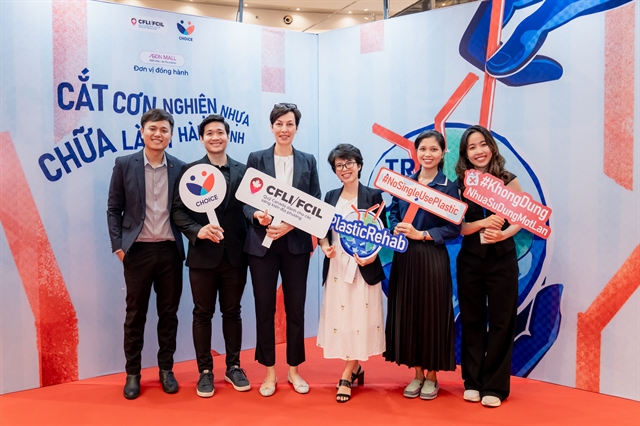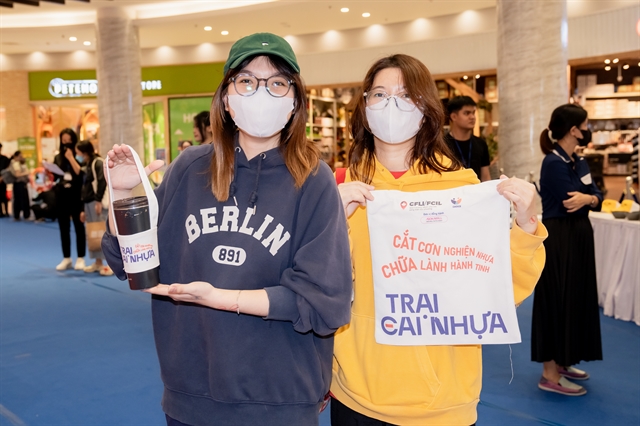 Society
Society

 |
| Consul General of Canada in HCM City Annie Dubé joins the ‘Plastic Rehab Camp’ communication project in HCM City. — Photos courtesy of Choice |
HCM CITY — The ‘Plastic Rehab Camp’ communication project has been initiated by Choice, a Vietnamese non-profit company, in HCM City to wean the community off using single-use plastic (SUP).
They want to change consumption habits and help build a more sustainable living environment.
Choice, which provides practical solutions and cost-effective services in environmental communications, education and sustainability consultancy, said the initiative is built with the slogan ‘Stop the plastic addiction, heal the planet’ in response to the alarming reality of plastic pollution.
“The project will help raise awareness about the harmful effects of plastic on health and the environment, and it is inspired by the model of recovery from bad habits (such as alcohol, tobacco and even sweets),” according to Choice’s statement.
“The ‘Plastic Rehab Camp’ emphasises the harm of ‘addiction’ to single-use plastic and practical solutions for ‘plastic rehab’ to change plastic consumption habits, contributing to reducing plastic pollution and protecting public health and the environment.”
The Plastic Rehab Camp event, which took place at the AEON MALL, in Tân Phú district of HCM City, offered an experiential space for self-assessing the level of ‘plastic addiction’, exploring information about plastic pollution and hands-on testing of ‘plastic rehab’ solutions.
Consul General of Canada in HCM City Annie Dubé said: "Plastic pollution is threatening our oceans, harming marine life and ultimately affecting our health. Reducing plastic is not just a trend but everyone's responsibility. I am delighted to witness the Plastic Rehab Camp inspiring people to take action and build a greener planet together."
The project has been working with Tiktok to promote a warning message: ‘Choose plastic addiction, choose danger’. It also shares regularly information and stories for ‘plastic rehab’ on Facebook.
 |
| Two young visitors explore the Plastic Rehab Camp in HCM City. The project offers opportunities for young people and consumers to reduce plastic use in daily life activities. |
Director of Choice, Trần Thanh Kim Tiến said: "The transition from awareness to action is a long journey. The Plastic Rehab Camp project is expected to call for cooperation for a greener future, helping people recognise the problem and work together to find solutions.
"We need the joint efforts of the community and all stakeholders to achieve sustainable success."
The ‘Plastic Rehab Camp’ project has received support from the Canada Fund for Local Initiatives (CFLI) and partners such as AEON MALL Tân Phú Celadon Shopping Centre, Lagom Vietnam and goodwill ambassadors through the TikTok platform, singers Du Uyên, Dao and Marko Nguyen. VNS
Statistics on the harmful effects of single-use plasticsHCM CITY Every year in Việt Nam, up to 1.8 million tonnes of plastic waste are discharged into the environment. However, only 27 per cent of this is recycled by facilities and businesses. Việt Nam is among the top four countries with the most significant amount of plastic waste discharged into the sea, accounting for up to six per cent of the global total. Additionally, Vietnamese people use up to 30 billion plastic bags each year, and over 80 per cent of them are discarded after only one use, causing severe damage to the environment and ecosystems.On average, each person inadvertently ingests about 5 grams of plastic weekly - equivalent to a credit card. Some toxic substances, like BPA in plastics, can seep into food, causing diseases such as liver dysfunction, insulin resistance, affecting fetuses and damaging the brain. Equally alarming, microplastics have been found in breast milk. Three-quarters of samples from 34 healthy mothers contained 1-5 microplastic particles, posing a risk to the health of newborns and future generations. Microplastic concentrations of 0.05-10mg per litre can cause oxidative stress, leading to inflammation and severely affecting the human brain and epithelial cells.For marine life, single-use plastics are considered a ‘deadly trap’ set to claim the lives of aquatic creatures at any time. Over 700 marine species have been recorded as being injured from ingesting or getting entangled in plastics, with an estimated 100,000 marine mammals dying each year. By 2050, researchers predict that 99 per cent of seabirds will have plastic in their bodies, seriously threatening their lifespan and reproductive ability, putting many seabird species at risk of extinction. Over 56 per cent of whales and dolphins have ingested plastic and often suffer a painful death when plastic blocks their airways and stomachs.The Plastic Rehab Camp project calls on the community to sign the commitment 'To refuse single-use plastics', share creative ideas and solutions to reduce plastic waste at https://choicevn.com/tu-choi-nhua-dung-mot-lan/. — VNS




